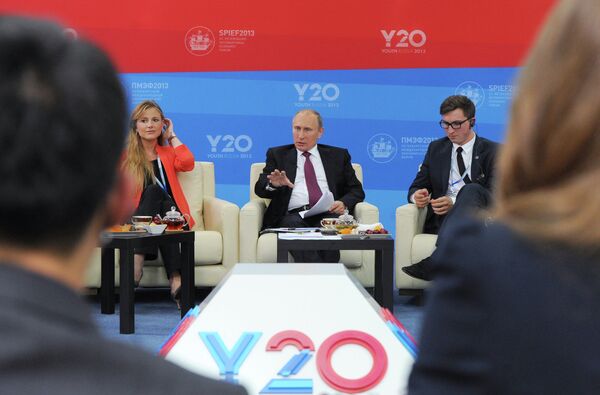ST. PETERSBURG, June 20 (RIA Novosti) - Russian President Vladimir Putin on Thursday admitted that offshore zones are used excessively by Russian companies.
“That is a problem for us. Offshore areas are used excessively,” Putin said at a meeting with young representatives from G20 countries.
Y20 Russia 2013 is a currently ongoing youth summit bringing together the brightest young people from the G20 countries to discuss issues closely related to the topics of the G20 Leaders’ Summit. It is the official G20 youth event held under Russia’s G20 Presidency. The summit’s final communiqué will be presented to the G20 leaders in September 2013.
“Often even regarding large facilities we do not know who is the end owner of this or that facility, and we cannot find them,” Putin said.
“Legal entity X is registered in Cyprus, and then it turns out that what is registered in Cyprus is a subsidiary of what is registered on the Cayman Islands… It’s like a Russian matryoshka doll,” he said. "It is unclear what is at the end of it."
The Russian leader said relevant international agreements should be signed to mark the first stage of struggle in that sphere.
Addressing the offshore problem, Putin said that first of all, it is necessary to disclose the end beneficiary. Second, there should be unified rules of offshore zones’ operation. And third, he said, no vague tax-evading tools should be used.
Putin said Tuesday at a press conference after a G8 summit in Northern Ireland that Russia would develop a national plan to deal with offshore tax havens.
“We are in the process of adopting legislation to disclose the end beneficiary,” he said, adding that he would sign the bill into law as soon as it is passed by parliament.
“De-offshorization” is not only a problem for Russia, but for the global economy as well, he said, adding that excessive “offshorization” of the Russian economy was bad insofar as it scares off potential investors who do not understand “who they have to deal with.”
Putin said last week that Russia would use its G8 rotating presidency in 2014 to push for international regulation of offshore tax havens, following up on a campaign against offshore havens begun by British Prime Minister David Cameron, the current head of the G8.


